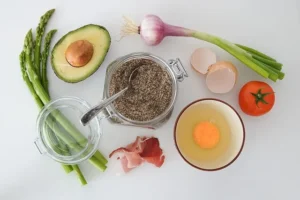What is a avocado?

Avocado, scientifically known as Persea americana, is a unique and versatile fruit that has gained immense popularity worldwide for its exceptional taste and numerous health benefits. Native to south-central Mexico, avocados have transcended their geographical origins to become a global culinary sensation. This green, creamy fruit has found its way into various cuisines, from salads to smoothies, and has even earned the moniker “green gold” for its nutritional richness. In this comprehensive exploration, we will delve into the origin, nutritional composition, culinary uses, and health benefits of avocados, shedding light on why this fruit has become a staple in the modern diet. What is a avocado?
Historical Roots:
The history of avocados dates back thousands of years, with evidence suggesting that they were cultivated in parts of central and south Mexico as early as 500 B.C. The Aztecs, who revered avocados for their supposed aphrodisiac properties, were among the first to cultivate and consume this unique fruit. Spanish explorers and colonizers later introduced avocados to Europe, and from there, the fruit gradually spread to other parts of the world. Today, avocados are grown in various countries with suitable climates, including the United States, Chile, Israel, and South Africa.
Botanical Characteristics:
Avocado belongs to the Lauraceae family and is characterized by its evergreen tree, which can reach heights of up to 20 meters. The fruit itself is botanically classified as a berry and is typically pear-shaped with a leathery skin and a large, central seed. The skin color can vary from dark green to almost black, depending on the avocado variety. There are several avocado varieties, including Hass, Fuerte, Reed, and Bacon, each with its own distinct flavor, texture, and appearance.

Nutritional Composition:
One of the key reasons for avocados’ widespread popularity is their exceptional nutritional profile. Avocados are rich in healthy monounsaturated fats, particularly oleic acid, which is associated with various health benefits, including heart health. Additionally, avocados are a good source of essential vitamins and minerals, including:
Vitamins:
Vitamin K: Avocados are a rich source of vitamin K, a fat-soluble vitamin crucial for blood clotting and bone health. Adequate vitamin K intake supports the body’s ability to form blood clots, preventing excessive bleeding. Additionally, it plays a vital role in bone metabolism, promoting bone density and strength.
Vitamin E: Another standout vitamin found in avocados is vitamin E, a potent antioxidant known for its cell-protective properties. Vitamin E neutralizes free radicals, reducing oxidative stress and potentially lowering the risk of chronic diseases. This vitamin also contributes to skin health, promoting a radiant and youthful complexion.
Vitamin C: Avocados contain vitamin C, a water-soluble vitamin renowned for its immune-boosting properties. Vitamin C supports the production of collagen, a protein crucial for skin elasticity and wound healing. Additionally, it enhances the absorption of non-heme iron from plant-based foods, aiding in the prevention of iron deficiency.
Folate (Vitamin B9): Folate is a B-vitamin essential for cell division and DNA synthesis. Avocados provide a significant amount of folate, making them particularly beneficial for pregnant women as adequate folate intake is crucial for fetal development and the prevention of neural tube defects.
Vitamin B6: Avocados contribute to the body’s vitamin B6 levels, which play a key role in brain development and function. Vitamin B6 is involved in the synthesis of neurotransmitters, such as serotonin and dopamine, which regulate mood and support overall mental well-being.
Minerals:
Potassium: Avocado reigns supreme as a potassium powerhouse. This essential mineral plays a pivotal role in maintaining proper fluid balance, regulating blood pressure, and supporting heart health. A 100-gram serving of avocado can provide a significant portion of the recommended daily intake of potassium, making it a valuable addition to a heart-healthy diet.
Magnesium: Avocados are a good source of magnesium, a mineral with diverse functions in the body. Magnesium is integral to muscle and nerve function, supports bone health, and contributes to the synthesis of DNA and protein. Including avocados in one’s diet helps ensure an adequate intake of magnesium, promoting overall well-being.
Copper: The presence of copper in avocados adds another layer of nutritional value. Copper is essential for the formation of red blood cells, the absorption of iron, and the maintenance of a healthy immune system. Avocados contribute to the recommended daily intake of copper, enhancing the body’s ability to function optimally.
Manganese: Avocados contain manganese, a trace mineral that supports bone development, collagen formation, and antioxidant defense mechanisms. While required in smaller amounts compared to some other minerals, manganese is nonetheless vital for various physiological processes.
Iron: Avocados also provide a modest amount of iron, a critical component of hemoglobin responsible for oxygen transport in the blood. While not as iron-rich as some other foods, avocados can contribute to overall iron intake, particularly when part of a well-rounded diet.
Fiber:
Dietary Fiber Content: Avocados are an excellent source of both soluble and insoluble fiber. A 100-gram serving of avocado typically provides around 7 grams of fiber, making it a substantial contributor to daily dietary fiber needs. This places avocados among the select fruits recognized for their high fiber content.
Soluble Fiber: The soluble fiber in avocados dissolves in water, forming a gel-like substance that slows down digestion. This helps regulate blood sugar levels and contributes to a feeling of fullness, aiding in weight management. Soluble fiber is also known for its role in lowering cholesterol levels, promoting cardiovascular health.
Insoluble Fiber: Insoluble fiber adds bulk to the stool, facilitating regular bowel movements and preventing constipation. Avocados’ insoluble fiber content supports a healthy digestive system by promoting the smooth passage of food through the digestive tract. This aids in the prevention of gastrointestinal issues and contributes to overall gut health.
Prebiotic Properties: Avocados contain certain fibers with prebiotic properties, promoting the growth and activity of beneficial gut bacteria. A healthy balance of gut bacteria is associated with improved digestion, enhanced nutrient absorption, and a strengthened immune system.
Blood Sugar Regulation: The fiber in avocados plays a role in stabilizing blood sugar levels by slowing the absorption of sugars. This is particularly beneficial for individuals with diabetes, as it helps prevent spikes and crashes in blood sugar, contributing to better overall glucose control.
The combination of these nutrients makes avocados a nutrient-dense food that can be a valuable addition to a balanced diet.

Culinary Uses:
Avocados are renowned for their versatility in the kitchen, and their creamy texture makes them a favorite ingredient in a wide range of dishes. Some popular culinary uses of avocados include:
Guacamole:
A classic Mexican dish made by mashing ripe avocados and combining them with ingredients such as onions, tomatoes, lime juice, and cilantro.
Salads:
Avocado slices or chunks add a creamy and nutritious element to salads, enhancing both flavor and texture.
Sandwiches and Wraps:
Avocado can be spread on bread or wrapped in tortillas, providing a healthy and satisfying alternative to mayonnaise or other high-calorie spreads.
Smoothies:
The creamy texture of avocados makes them an excellent addition to smoothies, enhancing their thickness and nutritional content.
Dressings and Sauces:
Avocados can be blended to create creamy dressings and sauces for pasta or grain bowls, offering a healthier alternative to traditional creamy sauces.
Health Benefits:
The consumption of avocados is associated with a myriad of health benefits, contributing to overall well-being. Among the main health advantages are:
Heart Health:
The monounsaturated fats in avocados, particularly oleic acid, have been linked to improvements in heart health by reducing bad cholesterol levels and promoting good cholesterol.
Weight Management:
Despite their higher calorie content, avocados may aid in weight management due to their fiber content, which promotes satiety and reduces the likelihood of overeating.
Eye Health:
Avocados contain lutein and zeaxanthin, antioxidants that are beneficial for eye health and may reduce the risk of age-related macular degeneration.
Blood Sugar Regulation:
The fiber and monounsaturated fats in avocados may contribute to better blood sugar control, making them a suitable food choice for individuals with diabetes.
Nutrient Absorption:
The presence of healthy fats in avocados can enhance the absorption of fat-soluble vitamins (A, D, E, and K) from other foods consumed in the same meal.
Conclusion:
In conclusion, avocados stand as a testament to the union of exquisite taste and nutritional excellence. From their humble origins in ancient Mexico to their present status as a global dietary phenomenon, avocados have transcended cultural boundaries and become a symbol of health-conscious eating. The unique combination of healthy fats, vitamins, minerals, and fiber makes avocados a valuable addition to a well-rounded diet. As we continue to explore and appreciate the multifaceted benefits of avocados, it becomes clear why this green gem has earned its place as a staple in modern culinary landscapes and is likely to remain a beloved and nutritious indulgence for generations to come.






